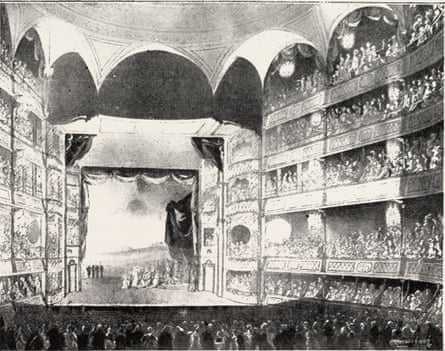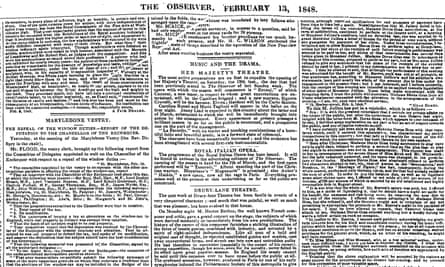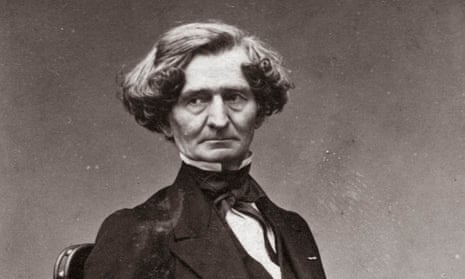The past week at Drury-lane Theatre has been fertile in events of a very chequered character; and much that was painful, as well as much that was pleasant, has been evolved in that house.
On Monday night M. Hector Berlioz, the well known French composer and critic, gave a grand concert on the stage, the subjects of which were derived mediately or immediately from his own productions. The history of the career of this composer furnishes a striking illustration of the force of innate genius, combined with industry, and actuated by a spirit of right-minded independence. Like all men of a bold and original cast of thought, he rejected established guides and models, cast away conventional forms, and struck one into new and untrodden paths.
The concert was necessary for the due appreciation in this country of the works of the composer, and the proper development of their largeness of design, their variety of combinations, and their novelty of style and phraseology; and, sooth to say, it removed several pre-existent prejudices from the minds of the dilettanti of the metropolis, hitherto imbued rather with the ideas of former days, as regarded the “score,” than with those of the present time.
In every sense of the word it was a grand concert; M. Berlioz’s orchestra, both in magnitude and quality, being equal to the expression of his grandest ideas; and correctness having been insured by a series of careful rehearsals. M. Berlioz himself conducted all through the performance. The instrumental orchestra and chorus were composed of two hundred and fifty performers and the solo parts were sung by Madame Dorus Gras, Miss Miran, Mr. Reeves, Mr. Weiss, and Mr. Gregg. It was in three parts. The first part consisted of the “Overture to the Carnival of Rome;” a romance, “The Young Shepherd,” sung by Miss Miran; and the symphony entitled “Harold in Italy.” The second part consisted of the first and second acts of “Faust;” and the third part contained a cavatina from the opera of “Benevenuto Cellini,” sung by Madame Dorus Gras; a chorus of souls in purgatory, taken from his “Requiem;” and the finale of the triumphal symphony, composed for the inauguration of the column of the Bastile.

Detailed criticism upon such a mass of music, of so original a character, and marked with so many peculiarities, either to form a decided judgment of its character, or to attempt any analysis or description of its style, would he out of the question; but the general impression left upon the mind was one of great grandeur and high power, mingled with a degree of obscurity, the depth of which it was impossible to penetrate. No great musician, however, was ever understood at once; and, in regard to such musicians as Beethoven, for example, the most sagacious critics have found themselves aridly committed by opinions hastily expressed.
It cannot be doubted, however, that Berlioz is a most imaginative composer; that his mind is richly stored with new and striking ideas; that he is a consummate master of all the resources of his art; that he has carried its descriptive powers further, probably, than they have ever been carried before; Beethoven always excepted; and that the effects which he produces by his orchestral combinations, and particularly by the employment of powerful brass instruments, are almost if not wholly unparalleled in grandeur and beauty.

The music of “Faust,” though frequently wild and fantastic in the extreme, is, on the whole, exceedingly dramatic. Nothing for instance can be more joyous than the dance and chortle of peasants, or more spirit-stirring than the “Hungarian March,” while the chorus of aerial spirits, inspiring the sleeping Faust with dreams of Margaret, exhibits a richness and delicacy of imagination of the loftiest character. The vocal solos were, however, comparatively feeble. Defective in flowing and rhythmical melody, the singers were unable to contend with the orchestral accompaniments, which were overpowering from their very fulness and complication.
The other parts of the concert were well executed; especially the cavatina allotted to Madame Dorus Gras; “The Young Shepherd,” by Miss Miran; and the sinfonia, “Harold in Italy.” The fine tenor of Mr. Reeves had full scope in the portions of the score assigned to him, and Mr. Weiss had justice done to his weighty bass by the composer. In every respect this concert was an important event in the musical annals of this country and it is hoped that M. Berlioz will be induced to give one more concert of the same description at least; his music, like all music of a really high class, gaining infinitely by repetition.

This is an edited extract. Read the full article. See also: Berlioz’s Faust performed in Manchester, 13 January 1882.

Comments (…)
Sign in or create your Guardian account to join the discussion